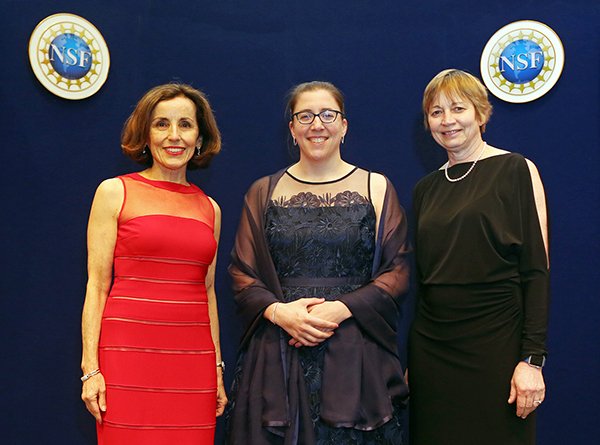Faculty Spotlight: Kristina Olson wins the NSF Alan T. Waterman Award
 |
| France Cordova, Kristina Olson, and Maria Zuber Photo: NSF/Rich Riggins |
Recently the National Science Foundation (NSF) awarded UW psychologist Kristina Olson the 2018 Alan T. Waterman Award, which is the nation's highest honor for early career scientists. Professor Olson was recognized for her innovative contributions to understanding children's attitudes toward and identification with social groups, early prosocial behavior, the development of notions of fairness, morality, inequality and the emergence of social biases. Kristina Olson is the first psychologist to receive the Waterman Award and the first woman since 2004 to receive the honor. As part of the award, Professor Olson will receive a five-year, $1 million research grant. We recently asked Professor Olson how she felt about receiving the prestigious NSF Alan T. Waterman Award:
1) What does it mean to you personally receiving the NSF Alan T. Waterman Award?
I am surprised, humbled, and honored to receive the Waterman Award. It meant a lot to me because I know that winning the award is a reflection of the amazing team of mentors, students, and colleagues that I've had a chance to work with over the last decade.
2) You are the first psychologist to ever receive the Waterman Award. What are your thoughts about NSF recognizing your work in psychology?
To be the first psychologist to win it is exciting, but mostly makes me want to represent the field well. While in DC I had to give several talks and I tried to focus on the contributions of the broader field of psychology because I know that so many people are doing such important work, not just me. I think it is wonderful that NSF and the National Science Board are increasingly recognizing the critical role of psychology in the nation's science agenda.
3) How do you think this award will impact your current research?
This award will allow me to try out some riskier ideas and move my work in some new directions. For example, I'm hoping to use this as an opportunity to learn more about intersex children's gender development. These are individuals whose sex at birth is not clear - they cannot be easily categorized as male at birth or female at birth. I'm also excited to use some of the money to start a summer internship program. The best way to improve scientific research, in my opinion, is to increase the number of people who are doing scientific research. I hope the internship can help assure that we have the best pool of future psychological scientists around!
4) What is the mission of your current TransYouth Project?
The TransYouth Project is the first large, national, longitudinal study of transgender children. These are children who are living as a gender that does not align with their sex at birth. It started when I arrived at UW because I realized we had a lot to learn about gender and general human development from this unique cohort of children. This project allows us to gain insight into the lives of transgender children as well as understand the contributors to mental health and well-being.